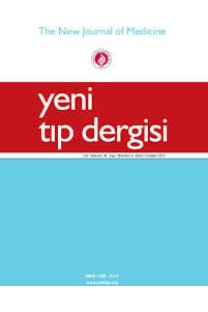Yoğun bakım ünitesinde akut böbrek yetmezliğinin patogenezi, prognozu ve tedavisi
The course, prognosis and treatment of acute renal failure in intensive care unit
___
- 1. Schrier RW, Wang W, Poole B, Mitra A. Acute renal failure: definitions, diagnosis, pathogenesis, and therapy. J Clin Invest 2004;114: 5-14.
- 2. Bernieh B, Al Hakim M, Boobes Y, Siemkovics E, El Jack H. Outcome and predictive factors of acute renal failure in the intensive care unit. Transplant Proc 2004;36: 1784-17.
- 3. Koreny M, Karth GD, Geppert A, Neunteufl T, Priglinger U, Heinz G, et al. Prognosis of patients who develop acute renal failure during the first 24 hours of cardiogenic shock after myocardial infarction. Am J Med 2002;112: 115-9.
- 4. Clarkson MR, Friedewald JJ, Eustace JA, Rabb H. Acute kidney injury. In: Brenner BM, ed. 8th ed. Brenner & Rector’s The Kidney. Philadelphia:Saunders; 2008; p: 951.
- 5. Mehta RL. Outcomes research in acute renal failure. Semin Nephrol 2003;23: 283-94.
- 6. Mehta RL, McDonald B, Gabbai F, Pahl M, Farkas A, Pascual MT, et al. Nephrology consultation in acute renal failure: does timing matter? Am J Med 2002;113: 456-1.
- 7. Oudemans-van Straaten HM, Bosman RJ, van der Spoel JI, Zandstra DF. Outcome of critically ill patients treated with intermittent high-volume haemofiltration: a prospective cohort analysis. Intensive Care Med 1999;25: 814-21.
- 8. Schwilk B, Wiedeck H, Stein B, Reinelt H, Treiber H, Bothner U. Epidemiology of acute renal failure and outcome of haemodiafiltration in intensive care. Intensive Care Med 1997;23: 1204-11.
- 9. Arabi Y, Ahmed QA, Haddad S, Aljumah A, Al-Shimemeri A. Outcome predictors of cirrhosis patients admitted to the intensive care unit. Eur J Gastroenterol Hepatol 2004;16: 333-9.
- 10. Wan L, Bellomo R, Di Giantomasso D, Ronco C. The pathogenesis of septic acute renal failure. Curr Opin Crit Care 2003;9: 496-502.
- 11. Lameire N, Van Biesen W, Vanholder R. Acute renal failure. Lancet 2005;365: 417-30.
- 12. Hoste EA, Blot SI, Lameire NH, Vanholder RC, De Bacquer D, Colardyn FA, et al. Effect of nosocomial bloodstream infection on the outcome of critically ill patients with acute renal failure treated with renal replacement therapy. J Am Soc Nephrol 2004;15: 454-62.
- 13. Liu KD. Molecular mechanisms of recovery from acute renal failure. Crit Care Med 2003;31: 572-81.
- 14. Uchino S, Bellomo R, Ronco C. Intermittent versus continuous renal replacement therapy in the ICU: impact on electrolyte and acid-base balance. Intensive Care Med 2001;27: 1037-43.
- 15. Schortgen F, Soubrier N, Delclaux C, Thuong M, Girou E, Brun- Buisson C, et al. Hemodynamic tolerance of intermittent hemodialysis in critically ill patients: usefulness of practice guidelines. Am J Respir Crit Care Med 2000;162: 197-202.
- 16. Van Biesen W, Vanholder R, Lameire N. Dialysis strategies in critically ill acute renal failure patients. Curr Opin Crit Care 2003;9: 491-5.
- 17. Marshall MR, Ma T, Galler D, Rankin AP, Williams AB. Sustained low-efficiency daily diafiltration (SLEDD-f) for critically ill patients requiring renal replacement therapy: towards an adequate therapy. Nephrol Dial Transplant 2004;19: 877-84.
- ISSN: 1300-2317
- Yayın Aralığı: 4
- Başlangıç: 2018
- Yayıncı: -
Prolonged pregnancies: Approaches in clinical management
İlknur İnegöl GÜMÜŞ, Zeynep KAMALAK, Nilgün Öztürk TURHAN
Submandibuler siyalolityazise yaklaşımımız
Sami BERÇİN, Ahmet KUTLUHAN, Veysel YURTTAŞ, Alper KANMAZ
Down sendromunda (trizomi 21) artmış nukkal kalınlık ve nazal kemik bulunmayan bir olgu
Tiroid fonksiyonları obezite için bir risk faktörü müdür?
Feridun KARAKURT, Ayşe ÇARLIOĞLU, Mustafa KÖROĞLU, Burak UZ, Benan KASAPOĞLU
Multipl skleroza benzer lezyonları bulunan auralı migren ve siringomiyeli olgusu
Difüzyon ağırlıklı manyetik rezonans görüntülemenin akut iskemik inmede tanı değeri
Bahri KEYİK, Bahar YANIK, SÜLEYMAN BAKDIK, Binnur Semiz ÖZKANLI, Baki HEKİMOĞLU
Uğur CANPOLAT, Alpay ÇELİKER, Işık Yasemin BALCI, Mualla ÇETİN, Kalkanoğlu Serap SİVRİ, Duygu Uçan
Erken evre glottik kanserlerde frontolateral larenjektomi sonuçlarının değerlendirilmesi
Selma KURUKAHVECİOĞLU, Ömer Tarık SELÇUK, Bülent ÖCAL, GÖKHAN KURAN, Nurettin ÖZDEMİR
Systemic lupus erythematosus presented with multiple avascular necrosis
Kıymet İkbal KARADAVUT, Aynur BAŞARAN, Bal AJDA, Aytül ÇAKCI, Göksal KESKİN
